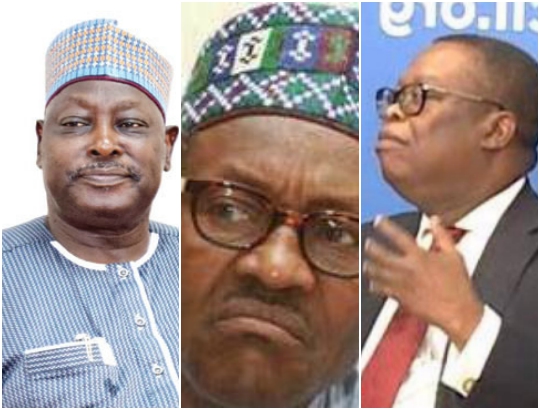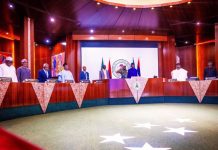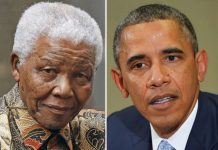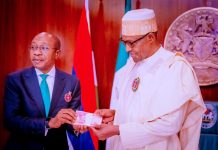Analysis – by Pat Chukwuelue
At the inception of President Muhammadu Buhari’s regime in May 2015, many Nigerians expected him to swing into action at once and drastically cut down the level of corruption in the land. Yes, this was one of the planks on the APC Campaign manifesto that certainly fetched it millions of votes. But when the new leader took all of five months to form his Executive Cabinet, the disappointed observers tagged him, President Go-Slow. And the tag has since stuck on him like glue.
Unfortunately, the President’s initial slow pace became compounded by his health challenges. One does not know where to draw the line between tardiness and deliberate nonchalance, in terms of policy. After almost one year of shunning public calls on him to take action, President Buhari last Monday finally approved the dismissal of the Secretary to the Government of the Federation (SGF), David Lawal, and the Director-General, National Intelligence Agency (NIA), Ambassador Ayo Oke. Many distraught citizens heaved heavy sighs of relief.
The matter did not have to drag for so long, especially for a government that took the moral highway by assuring Nigerians that it was prepared to fight corruption in whatever guise it manifests itself to a standstill. Supporters of the regime felt that swift action was required in the Lawal/Oke saga, if only to convince nay-sayers that the administration’s campaign against corruption was total and sincere. The foot-dragging by the government robbed it of a fine chance to score vital goals on its anti-corruption chart.
However, last Monday the presidency explained that the decision to sack the two embattled top officials, who had earlier been suspended over allegations of fraud leveled against them, followed President Buhari’s acceptance of the recommendations of the panel headed by Vice-President Yemi Osinbajo to terminate their appointments. The presidency immediately announced the appointment of Mr. Boss Mustapha to replace the sacked SGF.
A statement by the Special Adviser on Media and Publicity, Femi Adesina, said the president also approved the setting up of a three-member panel to, among other things, look into the operational, technical and administrative structure of the NIA and make appropriate recommendations. The three-man committee included the National Security Adviser (NSA) Babagana Monguno, and the Attorney-General and Minister for Justice, Abubakar Malami.
Vice President Yemi Osinbajo, who headed the Presidential Committee which investigated the allegations against the two men, had told newsmen after submitting his report last August that only President Buhari had the power to determine the fate of the top officials. Professor Osinbajo was, however, silent on the recommendations in the two-volume documents he handed to his boss at the Presidential Villa, Abuja.
The ex-SGF was interrogated by the panel over the N220 million meant for the welfare of Internally Displaced Persons (IDPs) in the North-East zone while Mr. Oke was suspended over the discovery of large amounts of foreign and local currencies by the Economic and Financial Crimes Commission (EFCC) in a residential apartment at Osborne Towers, Ikoyi, Lagos, which the NIA claimed as its own.
Many onlookers were not happy that the presidency deliberately allowed things to simmer for too long. For instance, as early as December last year, the Senate had called for the resignation of Mr. Lawal after its Committee which focused on the humanitarian crisis in the North-East indicted the SGF for corruption. People expected the APC administration at the center to wade into the matter and pursue it to its logical conclusion. But mum was the word, which drew public outcry over the refusal of the president to take action on the resolution passed by the upper legislative chamber.
For the opposition, the latest move by the presidency, which ordinarily should invite acclaim for the government, has ironically become like pouring fuel into a simmering flame. The main opposition party, the People’s Democratic Party, PDP, latched on to it. Trust politicians. They believe they have found a new weapon to use against their political opponents.
Reacting to the belated removal of Mr. Lawal and Ambassador Oke, the PDP called on the National Assembly to immediately initiate the process of impeachment against President Buhari for allegedly violating his oath of office through the twisting of the law against perceived opponents and in favour of his supporters.
In a statement by its spokesman, Dayo Adeyeye, in Abuja, the PDP expressed dismay that the president felt he could simply replace Mr. Lawal with Mr. Mustapha without subjecting the indicted official to prosecution. The party described the presidency’s remarks on the sack of Mr. David Lawal and Ambassador Oke as “a slap on the face of Nigerians. It is an insult to the-collective intelligence of our people who have waited patiently for the president’s reaction the humongous act of corruption by two of his principal aides and this is totally unacceptable’’. Of course, the fact that the nation has not been told about other sanctions awaiting the indicted fellows, is good cause for concern. But calling for the impeachment of the president based on this slip is like killing a fly with a sledge hammer. Even political opposition requires understanding the essence of moderation.


















